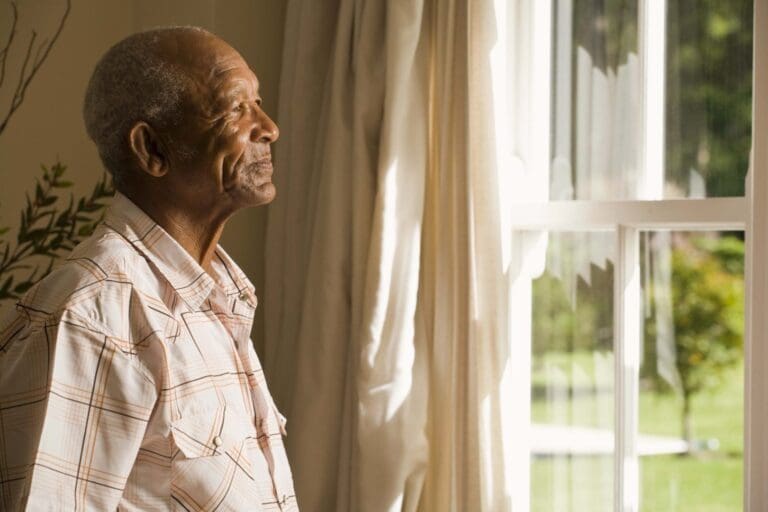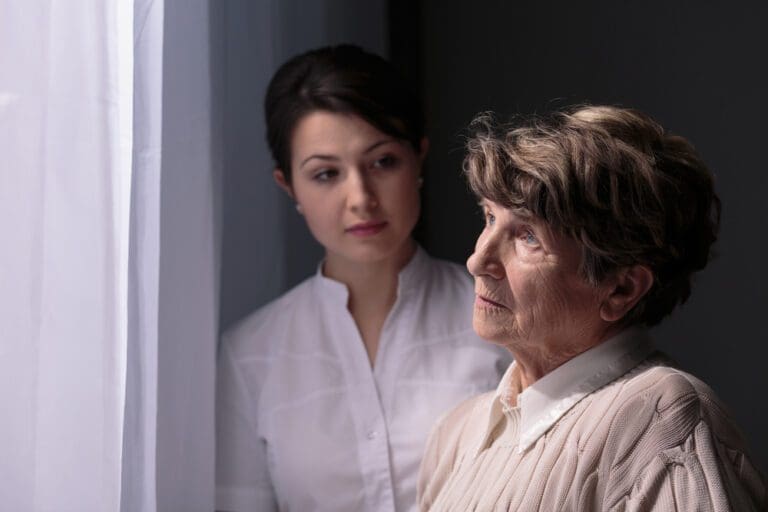Monitoring

Monitoring A Loner
Noah – Lisa’s Dad
Seniors requiring constant care can struggle with maintaining their personal space and privacy due to the need for assistance with daily activities and health monitoring. The presence of caregivers, whether family members or professionals, in their personal environment can make it challenging to retain a sense of privacy and autonomy, leading to feelings of vulnerability or loss of dignity.
Lisa’s loner dad would have considered someone watching him day and night a complete invasion of his privacy, but at the end of his life he didn’t even notice.
It was clear how much Lisa struggled with the idea of imposing constant surveillance on her dad. He had always been a private person, valuing his independence above all. But as his condition worsened, the need for around-the-clock care became undeniable.
Lisa wrestled with this necessity, torn between her father’s desire for solitude and the pressing need to ensure his well-being. Yet, it was a choice made out of necessity, a silent promise to keep her father safe, even in her absence.
Lisa had to hire round-the-clock caregivers to essentially sit and watch her dad sleep for ninety-nine percent of the time. He would sometimes sleep for days and then wake up at an odd hour needing to use the restroom.
Given that Lisa’s dad needed coverage seven days a week, twenty-four hours a day, Lisa hired eleven caregivers during a nine-month period. The reason for the high turnover was that she could not pay them as much as they could make elsewhere.
She remembers saying, “I know you are worth a lot more, but this is what I can afford. I can give you room, food and let you use my car, but I cannot afford to give you a higher wage.”
It was hard to find someone willing to do that, even when most of the time there was nothing to do. She hired students, people looking for a place to live, people looking for a second job, and a mom and daughter duo.
With the big gambling trip, he took with his friends before his health started declining, her dad had wiped out a big chunk of his savings. Seeing how excited he was about the trip, Lisa never thought to discuss setting a limit on his gambling funds before he went on the trip.
A few months into the round of clock care, his bank balance was rapidly depleting.
Lisa, in a state of panic, was sharing her challenges with a friend, who suggested that she may want to look into the county program that pays vetted caregivers directly to take care of low-income seniors.
A few weeks later her dad got approved for the program. They approved fifteen hours a week, which was by no means enough. She fought the ruling that was based on a visit by a county assessor.
She got a note from his doctor citing his lack of judgment while doing various activities of daily living.
She also created a log with columns for date, time, activity (such as meal preparation, bathing, medication assistance), duration of each task, specific difficulties or needs encountered, caregiver actions taken, and additional notes reflecting the senior’s mood, behavior changes, or any incidents. This log methodically tracked the daily care requirements and any emerging needs, offering concrete evidence for the necessity of increased support hours.
It was still not enough to cover the over 720 hours a month needed, but it certainly helped. The difficult part was finding someone that was county approved to provide the service. Some of the challenges included: availability, willingness to drive to my home, willingness to just sit and watch my mom sleep.
During sleepless nights, Lisa reflected on the journey that had brought them to this point. The roles had reversed, with Lisa now the protector, a guardian for the man who had once been her steadfast and powerful defender.
Despite the constant vigil, her father remained largely unaware of the extent of his care, his moments of clarity fleeting amidst the fog of his condition. Lisa found comfort in believing that, in his mind, her father still enjoyed the freedom he so cherished.

Friends Through Thick and Thin
Mark and Declan’s Story
Mark and Declan had been friends since elementary school. Their friendship had lasted decades, and now, as old men, they found comfort in knowing they still had each other. They had always been somewhat reclusive, preferring each other’s company over social gatherings.
One evening, Declan looked at Mark, who was resting on the couch. “You know, buddy, we’ve been through a lot together,” Declan said, his voice tinged with nostalgia.
Mark nodded, his hand trembling slightly. “Yeah, Declan. We’ve seen it all. Remember the time we skipped school and went to the swimming hole?”
Declan chuckled. “How could I forget? We got caught and were grounded for a month.”
Their laughter faded into silence as the reality of their current situation settled in. Mark had dealt with multiple heart attacks, and his health was rapidly declining. He had become more reclusive, rarely leaving the house. Declan, though healthier, had his own set of health issues.
“Mark, I’ve been thinking,” Declan began, hesitating. “We need help. I can’t keep doing this on my own.”
Mark frowned. “I don’t want strangers in our space, Declan. This is our home.”
“I know, but my health isn’t great either. We need someone to look after us. Just think about it,” Declan pleaded.
After much convincing, Mark reluctantly agreed. Declan hired a team of caregivers to provide round-the-clock care. At first, Mark resented the intrusion. He grumbled whenever the caregivers were around, making it clear he didn’t appreciate their presence.
One afternoon, as the caregivers were preparing lunch, Mark turned to Declan. “I still don’t like this, you know.”
Declan sighed. “I know, Mark. But we need them. They’re here to help.”
The caregivers, Jada and Mike, were kind and attentive, always ready to assist with anything Mark and Declan needed. Gradually, Mark started to see the benefits of having them around. They made sure he took his medications, prepared meals, and even shared stories.
One morning, Jada brought Mark his favorite breakfast, pancakes with blueberries. “Here you go, Mark. Just the way you like it.”
Mark eyed the plate, a small smile forming. “Thanks, Jada. I appreciate it.”
Mike, who was adjusting Mark’s pillows, added, “You know, Mark, we care about you and Declan. We’re here to make things easier.”
Mark looked at Declan, who gave him an encouraging nod. “Alright, maybe having you two around isn’t so bad after all.”
One day, Declan found Mark looking through an old photo album. “What are you looking at?” Declan asked, sitting beside him.
“Just reminiscing,” Mark replied, showing Declan a picture of them from their youth. “We’ve had some good times.”
Declan smiled. “We still do, Mark. We still do.”
As Mark’s health continued to decline, the caregivers were there to provide the necessary support. Declan, though frail, found solace in knowing that Mark was well taken care of.
One night, Mark looked at Declan with a serious expression. “Thank you, Declan. For everything.”
Declan, his eyes glistening with tears, nodded. “You’re my best friend, Mark. I’d do anything for you.”
Despite the challenges, their friendship remained steadfast, proof of the bond they had built over the years. The presence of the caregivers allowed them to focus on what truly mattered – their enduring friendship.

A Neighbor’s Kindness
Victoria, Daniel, and Arthur’s Story
Arthur was used to being a loner. He enjoyed his solitude, finding peace in the quiet moments of his life. Living alone in a small, cozy house on the outskirts of town, he rarely interacted with others, except for his neighbor, Victoria.
Victoria was a kind-hearted woman who had moved in next door a few years ago. She was always there with a smile and a helping hand, despite Arthur’s reclusive nature.
One sunny afternoon, Victoria knocked on Arthur’s door. “Hey, Arthur. I made some extra cookies and thought you might like some.”
Arthur opened the door, his face softening at the sight of Victoria. “Thanks, Victoria. You didn’t have to.”
“I know, but I wanted to,” she said, handing him the cookies. “How have you been?”
Arthur shrugged. “Same old. Just taking it day by day.”
Victoria noticed the fatigue in his eyes. “You know, Arthur, I’ve been worried about you. You seem more tired lately.”
Arthur sighed. “It’s nothing. Just getting old, I guess.”
A few weeks later, Arthur’s health took a turn for the worse. He started feeling dizzy and weak, struggling to do simple tasks. One morning, he collapsed in his living room. Victoria, hearing the thud through the thin walls, rushed over.
“Arthur, are you okay?” she exclaimed, helping him to a chair.
“I’m fine,” Arthur mumbled, but it was clear he wasn’t.
Victoria decided to take matters into her own hands. “You need help, Arthur. You can’t do this alone.”
Reluctantly, Arthur agreed. Victoria hired a caregiver to visit Arthur daily, ensuring he took his medications, ate properly, and had someone to talk to. Arthur was resistant at first, not wanting to lose his independence.
“Victoria, I don’t need someone watching me all the time,” Arthur grumbled.
“I know, Arthur, but I need to know you’re okay,” Victoria replied gently.
The caregiver, a young man named Daniel, was patient and understanding. He respected Arthur’s need for privacy while ensuring he was well taken care of. Slowly, Arthur began to accept Daniel’s presence.
One afternoon, as Daniel was helping Arthur with his groceries, Arthur looked at him. “You’re not so bad, you know.”
Daniel chuckled. “Thanks, Arthur. I’m just here to help.”
Arthur’s routine included daily check-ins from Daniel, who made sure Arthur’s house was tidy and that he ate properly. Arthur started to appreciate the company, though he’d never admit it out loud.
One day, Victoria stopped by to check on Arthur. “How’s it going with Daniel?”
Arthur shrugged. “He’s alright. Doesn’t bug me too much.”
Victoria smiled. “See? It’s not so bad having a little help.”
Arthur grumbled, “Yeah, yeah.”
One evening, Daniel brought over a puzzle, hoping to engage Arthur in something new. “Thought you might enjoy this. It’s a picture of a lighthouse.”
Arthur eyed the puzzle suspiciously. “I haven’t done a puzzle in years.”
“Well, no time like the present,” Daniel said, setting it up on the table.
They worked on the puzzle together, chatting about everything from sports to old movies. Arthur found himself actually enjoying the activity.
“You know, Daniel, you’re not half bad,” Arthur admitted.
“Thanks, Arthur. I’m glad we’re getting along.”
Victoria continued to check in on Arthur, relieved to see him in better spirits. “How are you feeling, Arthur?” she asked one day.
“Better, thanks to you and Daniel,” Arthur admitted.
Victoria hugged him. “We care about you, Arthur. You’re not alone.”
For the first time in years, Arthur felt a sense of community. The constant vigilance he once dreaded became a source of comfort, knowing that he was surrounded by people who genuinely cared about his well-being.


